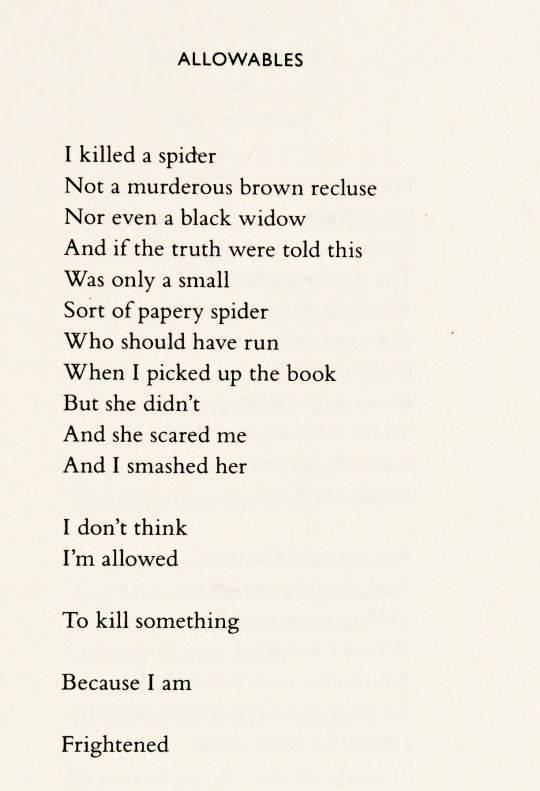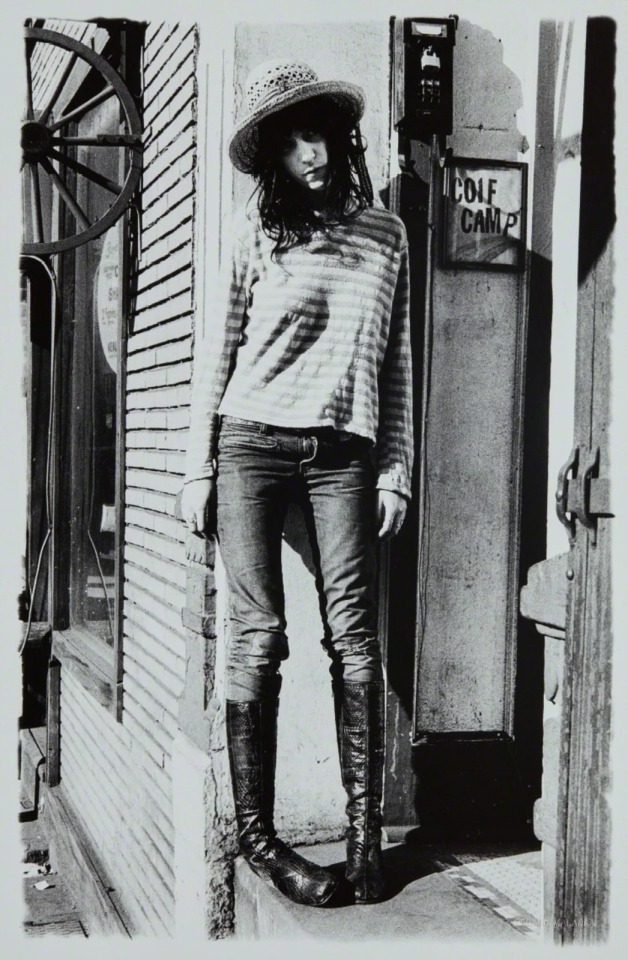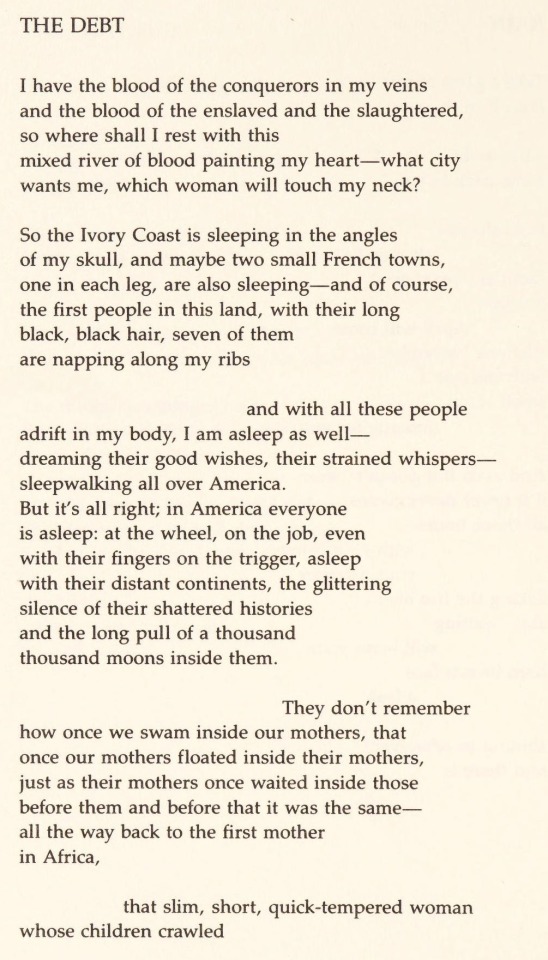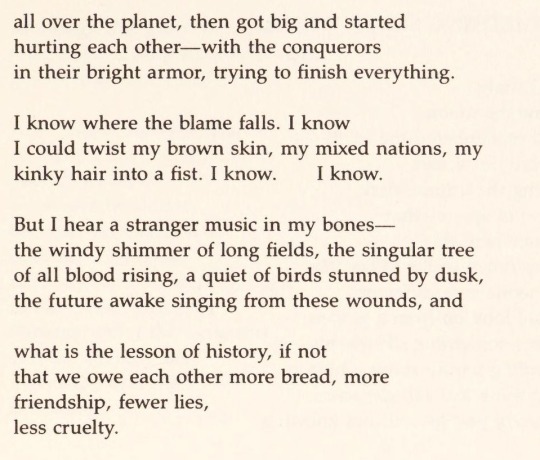#american poets
Photo

Nikki Giovanni, 'Allowables', ''Chasing Utopia'', 2013
Source
#nikki giovanni#Yolande Cornelia Giovanni Jr.#american poets#african-american poets#allowables#chasing utopia#poetry#police brutality
2K notes
·
View notes
Text
"March is a Light"
upon the dead grass
and houses, the wind
retains its edge, let it —
A light has cut it off
it blows bewilderedly
The grass shakes, the houses
seem, by the lack of foliage
about them, to turn
their angles forward into
the wind to let it pass —
William Carlos Williams
#william carlos williams#american poets#american poetry#american literature#20th century literature#20th century poetry#quotes#literature#lit quotes#literature quotes#poetry#seasonal poetry#quotations#literary quotes#march quotes#spring#spring quotes#springtime#e
11 notes
·
View notes
Text

#art#national poetry month#poets#american poets#poetry#art quiz#pagan sphinx art blog#art blogs on tumblr#still life
9 notes
·
View notes
Text
Sylvia Plath (/plæθ/; October 27, 1932 – February 11, 1963) was an American poet, novelist, and short story writer. She is credited with advancing the genre of confessional poetry and is best known for two of her published collections, The Colossus and Other Poems (1960) and Ariel (1965), as well as The Bell Jar, a semi-autobiographical novel published shortly before her death in 1963. The Collected Poems was published in 1981, which included previously unpublished works. For this collection Plath was awarded a Pulitzer Prize in Poetry in 1982, making her the fourth to receive this honour posthumously.[1]
.Info source WIKIPEDIA
68 notes
·
View notes
Quote
Sing to me once again, till I forget
That now we hate, and dream we love on yet.
Thy voice, if aught on earth, can wake regret,
Sing to me once again, till I forget.
Sing; at thy voice the old dream shall arise.
Make me thy fool, feed me again with lies,
—For I was happier, ere I grew so wise,
Sing; at thy voice the old dream shall arise.
Two Songs of Singing, Part I. by Anne Reeve Aldrich. As featured in The Rose of Flame and Other Poems of Love, 1889 edition.
#poem#poetry#poet#antique books#antique book#vintage book#vintage books#Anne Reeve Aldrich#american poets#1800s#1890s#1889#sing#love#hatred#nostalgia#dreams#lies#regret
13 notes
·
View notes
Text

NEW FROM FINISHING LINE PRESS: please thank you but why by Lysbeth Em Benkert
On SALE now! Pre-order Price Guarantee: https://www.finishinglinepress.com/product/please-thank-you-but-why-by-lysbeth-em-benkert/
please thank you but why is a collection of #poems about how we navigate sacred spaces, how we discover what’s true, and how the gods might answer our prayers, even as they whisper their own.
Lysbeth Em Benkert‘s poetry can be found in The Briar Cliff Review, Rogue Agent, Pasque Petals, and One-Sentence Poems, among other places. Her first chapbook, #girl stuff, is available from Dancing Girl Press.
PRAISE FOR please thank you but why by Lysbeth Em Benkert
Lysbeth Benkert’s Please thank you but why sings of and from the liminal spaces of the in between. Traversing a circular gyre between mythology and reality, history and the present, archetype and individual subject, absence and fullness, silence, and song, these linguistically crisp poems call and echo between plea, gratitude, and questioning with heartbreak, wit, and panache. Maybe the stasis of limbo can be recast as the fluidity of the liminal, these poems suggest. Maybe the dystopian banalities of the present tense are always/already timeless.
–Lee Ann Roripaugh, Author of Tsunami vs. the Fukushima 50
Cerebral, sharp, and surprising, Lysbeth Em Benkert’s Please thank you but why traces a mind’s equilibrium as it confronts change. With spare syntax and pared-back lines, the poet needles wisdom into her work. Benkert’s is a democratic intelligence. She hails a Sumerian goddess, the Greek pantheon, a Roman poet, The Bard, the Virgin Mary, physics, and The Wizard of Oz, and yet these poems are smart without making a reader feel stupid. At once, Benkert suggests her concerns are timeless and offers us a modern take: “like you have to be…. / fucked up in order to get your second chance because repenting after sliding / through on gray mediocrity isn’t enough for redemption.” With its remixes in form deepening insight at every level, Please thank you but why will compel a pondering pleasure.
–Christine Stewart-Nuñez, South Dakota Poet Laureate 2019-2021
Please share/repost #flpauthor #preorder #AwesomeCoverArt #read #poems #literature #poetry
#poetry#flp authors#preorder#flp#poets on tumblr#american poets#chapbook#chapbooks#finishing line press#small press
9 notes
·
View notes
Text

Gerard Malanga
Patti Smith Tomboy
1971
#gerard malanga#patti smith#american artists#american poets#american music#warhol factory#american photographer#artist portrait#celebrity portraits#modern art#aesthetic#art history#aesthetictumblr#tumblraesthetic#tumblrpic#tumblrpictures#tumblr art#american art#tumblrstyle#beauty aesthetic#beauty#artists on tumblr
9 notes
·
View notes
Text
Emily Dickinson
Emily Dickinson, an American poet, was born in 1830 in Amherst, Massachusetts. She spent the majority of her days in her hometown, with only brief excursions elsewhere for schooling or visits. Her family, with ties to Amherst College and active participation in local affairs, provided a sturdy foundation for Emily's upbringing. Her father, Edward Dickinson, was a respected lawyer and politician, while her mother, Emily Norcross Dickinson, battled with poor health, drawing Emily into caretaking duties as she grew older. Emily had two siblings, her sister Lavinia and brother Austin
Education played a significant role in Emily's formative years. Her time at Amherst Academy, where she cultivated friendships and wrote for school publications, set the stage for her intellectual pursuits. Later, at Mount Holyoke Female Seminary, Emily encountered a more structured religious environment, which would later influence her poetic themes of rebellion against societal norms and religious scepticism.
There are many speculations surrounding her affection for individuals such as Charles Wadsworth and Samuel Bowles as well as Judge Otis P. Lord, passionately expressed in her letters to him. Moreover, Dickinson's relationship with her sister-in-law, Susan Gilbert is debated too. Dickinson's letters to Susan reveal a depth of affection and intimacy that suggests a significant emotional connection beyond mere friendship.
In April 1862, Emily Dickinson penned a letter to the esteemed literary figure Thomas Wentworth Higginson, in response to his article in Atlantic Monthly titled “Letter to a Young Contributor.” In her letter, Dickinson, seeking guidance and validation for her poetry, enclosed four of her poems and earnestly asked Higginson for his assessment of her work. She expressed uncertainty about the vitality of her verse and pleaded for his honest opinion, stating that she had nobody else to turn to for feedback. Despite his initial reservations, Higginson advised Dickinson to continue refining her poetry before considering publication.
In her later years, Emily Dickinson led an increasingly isolated life. She often wore white and rarely interacted or greeted guests, avoiding social meetings. The deaths of loved ones, including her mother, father, and close friends, profoundly impacted Dickinson, deepening her sense of solitude and melancholy.
https://web.archive.org/web/20180807012709/http://www.emilydickinsonmuseum.org/publications_lifetime
6 notes
·
View notes
Photo


Tim Seibles, 'The Debt', ''Hurdy-Gurdy'', 1992
Source
212 notes
·
View notes
Text

Julia C.R. Dorr, i go to prepare a place for you
#julia c.r. dorr#julia dorr#literature#bibliophile#poetry#upload#quotes#poem#lit#classic literature#literary#american writer#american poets#american literature#american poetry#caroline ripley
21 notes
·
View notes
Text
"isn't it time / when the fires are too many / to eat the fire and not the cake / and drip the fires from my teeth / as once I had my hot hot youth?"
Paul Goodman, Birthday (1951)
#quotes#literature#lit#poetry#spilled ink#modern literature#50s literature#50s poetry#american poetry#american literature#american writers#american authors#american poets#paul goodman#birthday poetry#birthday poems#age poetry#age poems
12 notes
·
View notes
Text
"Let us go forth together to the spring:
Love must be this, if it be anything."
~ Edna St. Vincent Millay, sonnet xxviii
#edna st. vincent millay#quotes#poetry#literature quotes#poetry quotes#literary quotes#literature#classic lit#classic literature#classic poetry#american poetry#american lit#american literature#american poets#american author#poems and poetry#20th century literature#20th century poetry#spring#springtime#spring quotes#seasonal poetry#seasonal quotes#love quotes#e
7 notes
·
View notes
Text

"trout lilies" by mary oliver, from why i wake early
#favorites#mary oliver#why i wake early#on childhood#on nature#poetry#american poets#poems#springtime#spring#spring equinox
2 notes
·
View notes
Text
Here is my favorite Robinson Jeffers poem (published posthumously after he died in 1962):
Vulture
I had walked since dawn and lay down to rest on a bare hillside
Above the ocean. I saw through half-shut eyelids a vulture wheeling high up in heaven,
And presently it passed again, but lower and nearer, its orbit narrowing, I understood then
That I was under inspection. I lay death-still and heard the flight-feathers
Whistle above me and make their circle and come nearer.
I could see the naked red head between the great wings
Bear downward staring. I said, "My dear bird, we are wasting time here.
These old bones will still work; they are not for you."
But how beautiful he looked, gliding down
On those great sails; how beautiful he looked, veering
away in the sea-light over the precipice. I tell you solemnly
That I was sorry to have disappointed him. To be eaten
by that beak and become part of him, to share those wings and those eyes--
What a sublime end of one's body, what an enskyment;
What a life after death.
#poetry#american poets#inhumanism#what an enskyment#I love vultures#poems about how awesome birds are
18 notes
·
View notes
Text
You came in out of the night
And there were flowers in your hands,
Now you will come out of a confusion of people,
Out of a turmoil of speech about you.
— Ezra Pound, 'Francesca'
#ezra pound#20th century poets#american poets#poetry quotes#grief#loss#pound turned out to be a fascist so there's that
4 notes
·
View notes
Text
If I were to be anywhere
It’s late in December.
Flickering fairy lights, naked trees, and feathery-light snow fill the night air. You’re sitting by the window as you smoke your last cigarette and shake off the ashes on the ashtray I got you last year for Christmas. The scene is an unfinished canvas with coffee stains on the rug and the unmade bed where we had sex. Where you kissed every inch of me with lips that tasted sweeter than a cherry tart. No view is better than seeing you walking around naked in our small apartment.
—o.r
#myface#self love poetry#short poetry#love poetry#american literature#healing poetry#feel better#romantic poetry#american poets#break up poem
3 notes
·
View notes